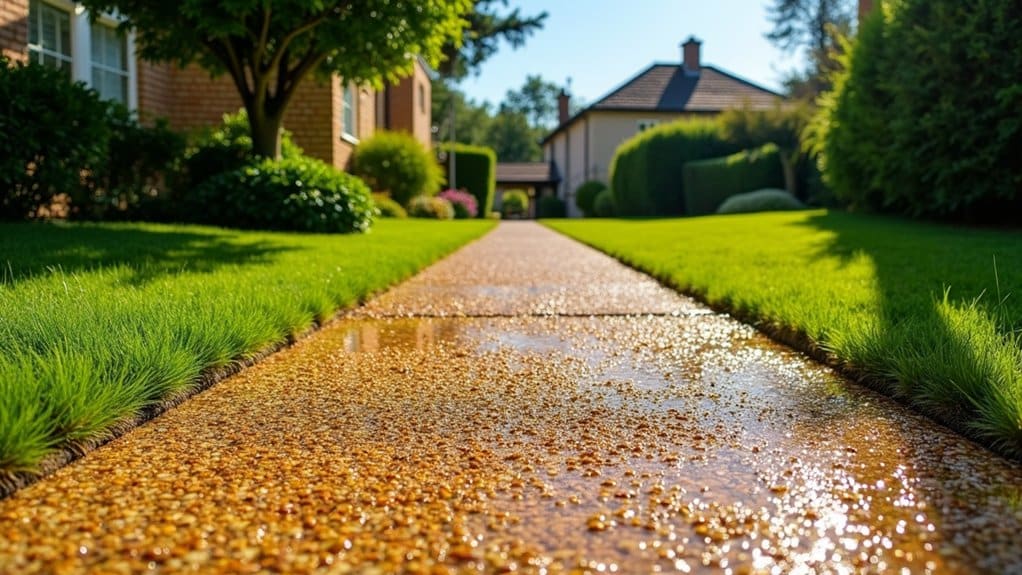Resin-bound gravel sorts out drainage problems brilliantly by letting rainwater soak straight through, much like a giant sponge. Think of it as thousands of tiny channels working together – when it buckets down, there’s no puddles or flooding to worry about, and the water simply filters into the ground below. Unlike traditional concrete or tarmac, it’s far less hassle to maintain and won’t crack when cars drive over it. It’s also naturally grippy when wet, making it safer for both vehicles and pedestrians. Across the UK, builders and homeowners have used it to transform waterlogged driveways and garden paths into smart, practical surfaces that handle our British weather properly.
Key Takeaways
Resin-bound gravel tackles UK drainage woes head-on through its naturally porous surface, much like a giant sponge soaking up our notorious British rainfall. You’ll notice the difference straight away – no more puddles collecting on your driveway during those heavy downpours.
The system ticks all the boxes for UK planning regulations, particularly vital in areas where water runoff affects local waterways. Think of it as a natural filter that helps protect our streams from pollutants.
Real-world tests show it’s tough as nails – handling everything from family cars to delivery vans without cracking or sinking. Unlike traditional concrete drives that often need patching up, resin-bound surfaces keep their good looks with minimal fuss.
Beyond the practical benefits, it smartens up any property whilst sorting drainage issues. It’s a bit like getting double value – a smart-looking drive that actually works harder than it looks.
When you tot up the numbers, you’ll spend less over time compared to concrete or block paving. Fewer repairs mean more money in your pocket, making it a savvy choice for British homeowners.
Overview of the Drainage Challenge
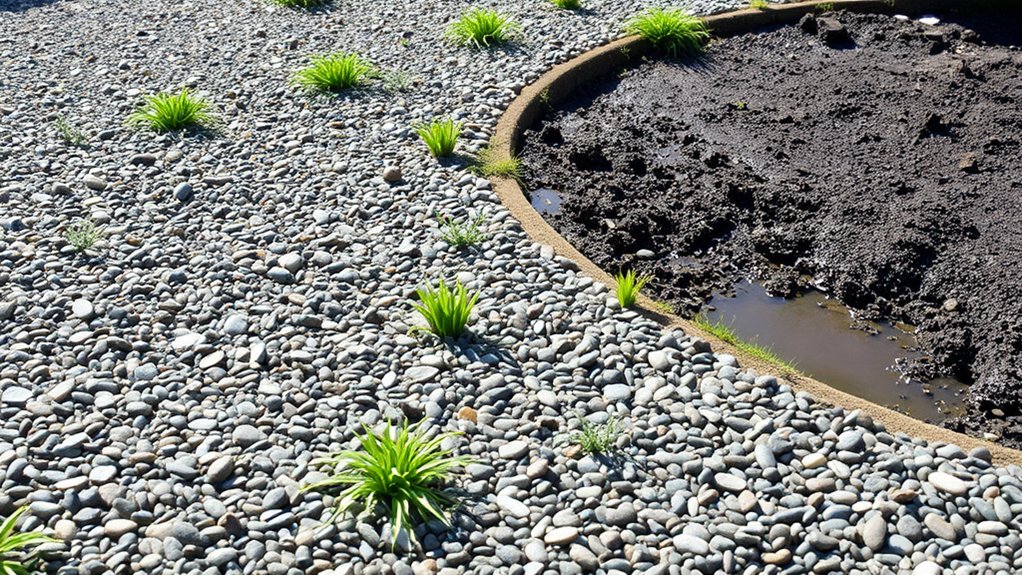
Drainage Problems: Key Challenges
Proper drainage is vital for any property or building site in the UK. Common issues like blocked gutters and clogged drains restrict water flow, often leading to flooding during our frequent rainy spells. Clogs and debris hinder proper drainage and can exacerbate these problems. Additionally, using materials with high permeability rates can significantly improve water management and reduce flooding risks.
Poor surface gradients make matters worse – just think of a garden patio that’s been laid flat rather than with a slight tilt. Without sound drainage, water builds up quickly. This can damage building foundations, create boggy gardens and, in worst cases, lead to subsidence.
On building sites, both short-term and permanent drainage must be sorted to handle rainwater properly. It’s not just about keeping the site workable – it’s a legal requirement to protect local streams and rivers from pollution.
Getting these basics right helps avoid costly repairs and keeps you on the right side of UK environmental laws. Think of drainage as your property’s plumbing – when it works well, you hardly notice it, but when it fails, the problems are hard to ignore.
Understanding Resin-Bound Gravel Technology

Resin-bound gravel surfaces offer exceptional drainage through their porous structure, much like a coffee filter letting water pass through. The system prevents those annoying puddles you might spot on traditional pavements during British rainstorms. Think of it as thousands of tiny pathways that allow rainwater to seep naturally into the ground below. Built to withstand our varied UK weather, from summer heat to winter frost, these surfaces maintain their strength and structure year-round whilst helping tackle localised flooding issues. Additionally, this remarkable permeability helps support Sustainable Urban Drainage Systems (SuDS), ensuring that the environment benefits from effective water management.
Permeability Mechanism Explained
The permeability of resin-bound gravel works through a simple yet clever design. Small gaps between the stone particles, held together by resin, allow rainwater to filter through naturally. Think of it like a coffee filter – water passes through whilst the grounds stay put. These gaps connect to form channels throughout the surface, helping rainwater drain downwards instead of forming puddles. The resin keeps the stones in place without blocking these vital drainage paths. When laid properly on suitable ground preparation, the system prevents waterlogging and helps manage heavy rainfall effectively. This makes it particularly useful for British weather conditions, where proper drainage is essential for preventing flooding in urban areas. Additionally, this permeable surface is designed to support groundwater replenishment, enhancing environmental sustainability. The system can handle up to 95% of rainfall, making it highly effective during heavy downpours.
Technical Benefits Overview
Resin-bound gravel brings clear technical advantages for outdoor surfaces across the UK. By mixing small stones with resin, it creates a robust surface that can handle heavy loads – perfect for your car on the driveway or busy garden paths. The material stands up well to British weather and rarely cracks, unlike traditional concrete or tarmac.
A key benefit is its drainage capability. The surface lets rainwater soak through naturally, meeting SUDS requirements and helping prevent local flooding – particularly useful during our wet winters. Think of it as a giant sponge that manages water effectively whilst staying firm underfoot.
The non-slip surface proves invaluable in typical British conditions, making it safer than conventional paving when wet.
Maintenance is straightforward too – a quick sweep and occasional power wash keeps it looking smart, saving both time and money long-term.
Practical benefits aside, it’s an environmentally sound choice that helps reduce water runoff in urban areas, making it increasingly popular for both domestic and commercial projects across Britain.
Permeability and Water Management
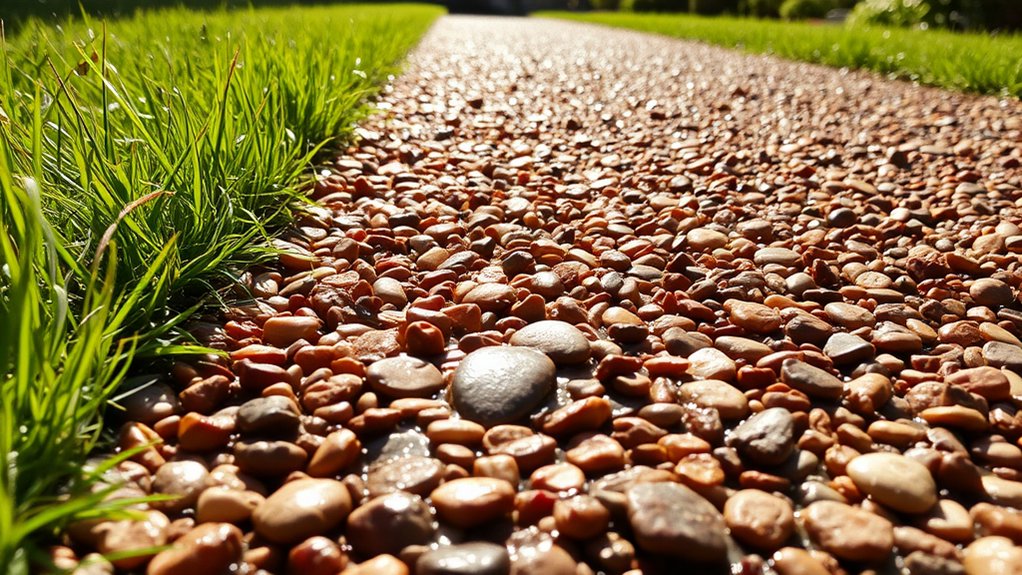
Resin-bound gravel offers excellent drainage qualities, making it a practical choice for British weather.
The porous surface lets rainwater filter through naturally, much like a traditional gravel path, but without the loose stones. This helps prevent puddles and surface flooding, particularly useful during heavy downpours.
Think of it as a built-in drainage system that keeps your outdoor spaces usable year-round whilst supporting local water management.
Natural Water Filtration
Natural water filtration is crucial for managing water resources across the UK. Different soil types determine how water moves through the ground and gets filtered naturally.
Think of sandy and gravelly soils like a coffee filter – their large particles create plenty of spaces for water to pass through quickly. Clay soils, however, work more like a blocked drain, with tiny particles that slow water movement and reduce filtering.
The soil’s ability to absorb water depends on how wet it already is and how heavily it’s raining – much like a garden sponge that can only soak up so much water before it’s full. This matters because pollutants can seep into our groundwater through this process, affecting the quality of our water supplies.
By understanding these natural filtering processes, we can better protect our water resources and maintain healthy ecosystems in our local areas.
This knowledge is particularly relevant for British farmers, land managers and local authorities who need to make informed decisions about water management.
Preventing Surface Water Accumulation
Surface water prevention relies heavily on how well resin bound gravel can handle rainfall. These surfaces naturally let water pass through, which stops puddles from forming.
The bigger the stone bits used, the better the drainage, as there’s more space between them for water to flow.
For best results, you’ll need a proper permeable base layer that meets SUDS requirements – these are the UK’s sustainable drainage guidelines. This setup helps prevent wear and tear whilst sending rainwater back into the ground where it belongs.
Adding drainage channels and getting the slope right makes the system even more effective. A well-planned resin bound surface cuts down flood risks and helps protect local wildlife, making it spot-on for modern British towns and cities.
Technical Specifications of Resin-Bound Gravel
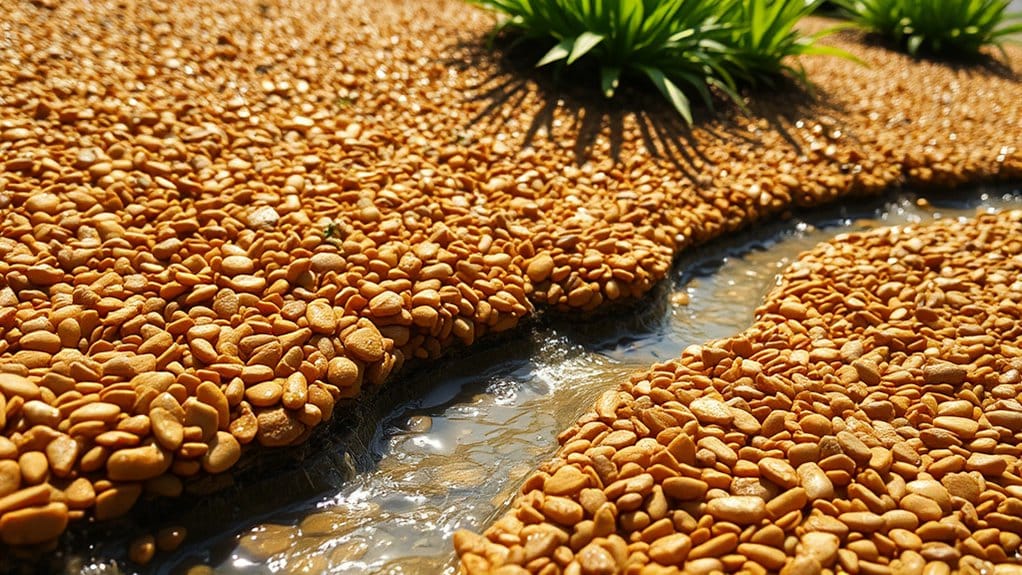
Technical specs for resin-bound gravel are crucial for proper installation and lasting results. The mix combines clean, kiln-dried stones (6-10mm) with a tough resin binder – think of it like mixing concrete, but with more precise measurements.
For best results, you’ll need:
- Clean, compacted sub-base (similar to preparing for a garden patio)
- Proper stone-to-resin ratios
- Even spreading at the right thickness
- Professional installation by certified workers
The weather matters too – installation needs the right temperature for proper curing, much like painting outdoors.
Stick to the manufacturer’s guidelines for mixing and laying, and you’ll get a permeable surface that handles British weather whilst looking smart.
It’s essential to use quality materials and follow proper installation steps – cutting corners typically leads to problems like loose stones or poor drainage down the line.
Operational Advantages for Homeowners

The operational benefits of resin-bound gravel make it a smart choice for UK homeowners. This surface effectively tackles Britain’s rainy weather through superior drainage, preventing those all-too-familiar puddles and flooding around your property.
Unlike traditional gravel or concrete, it needs little maintenance – you won’t spend weekends pulling weeds or fixing loose stones. The thin overlay fits neatly over most existing surfaces, meaning less hassle during installation and minimal disruption to your daily routine.
The non-slip finish provides sure footing in wet weather, whether you’re wheeling out the bins or parking your car. Built to last, it handles daily wear and tear without fading or breaking down, making it a sound long-term investment.
Resin-bound gravel delivers both practical benefits and kerb appeal, ticking all the boxes for a modern driveway solution.
Case Studies of Successful Installations

Case Studies of Successful Installations
Recent UK projects showcase how resin-bound gravel tackles common drainage problems whilst improving kerb appeal. Notable examples include:
- Chorley Residential Driveway: A tarmac replacement using decorative resin-bound gravel, laid over existing macadam for cost-effective installation.
- Ocean Grey Driveway: Built on permeable tarmac base, this SuDs-compliant surface prevents puddles and meets UK drainage regulations.
- SureSet Installations: Shows excellent adaptability through colour choices and strong water drainage, fixing previous flooding issues.
- Drive Cote Applications: Handles heavy vehicle use whilst managing rainwater effectively, proving both practical and attractive.
These real-world examples demonstrate how proper installation methods and smart design choices deliver both function and style.
Cost-Benefit Analysis of Resin-Bound Gravel Solutions
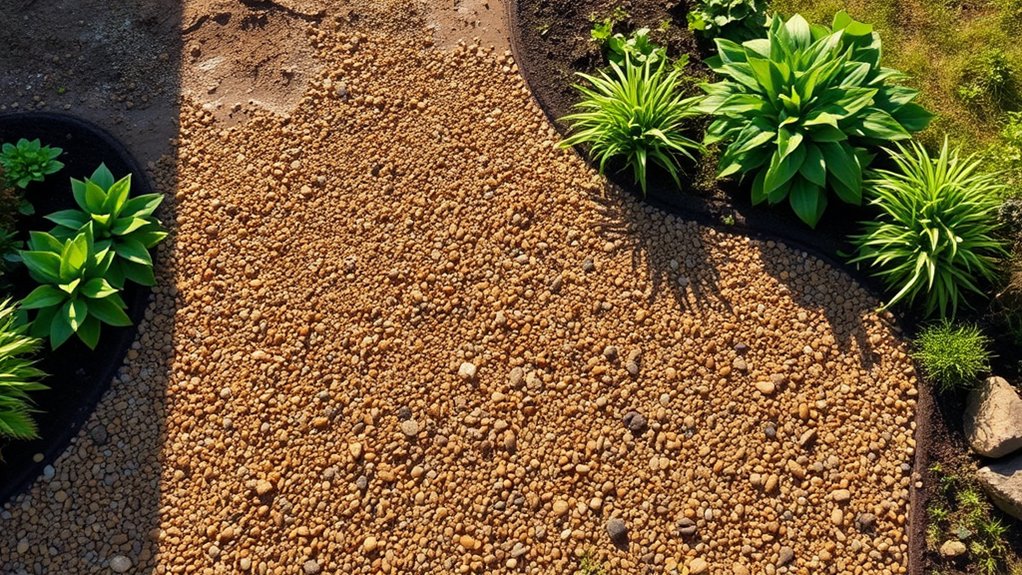
Resin-bound gravel proves effective for drainage solutions, though costs need careful consideration. Initial pricing typically ranges from £1,800 to £2,700, yet it outperforms traditional concrete and block paving in durability and upkeep costs.
While installation requires spending on materials, labour and basic tools, the higher upfront cost pays off over time. Think of it like investing in a quality winter coat – costlier at first but lasting years longer than cheaper alternatives.
The surface naturally prevents weeds and water pooling, meaning fewer repair bills down the line. Its attractive finish can boost property value too.
For example, a well-laid resin driveway can last 15-20 years with minimal maintenance, compared to concrete that often needs repairs after 5-10 years.
Taking the long view, resin-bound gravel delivers better value for money, making it a smart choice for UK homeowners seeking reliable drainage solutions.
Frequently Asked Questions
How Does Resin-Bound Gravel Compare to Traditional Paving Materials?
Resin-bound gravel outperforms traditional paving options like concrete or block paving in several ways. The smooth, contemporary finish looks smarter than standard surfaces and lasts far longer with minimal upkeep. Its porous nature handles British weather brilliantly, preventing puddles and ice patches common on conventional driveways. Whilst the initial cost runs higher than basic paving, the durability and low maintenance needs make it a sound investment for UK homeowners.
Can Resin-Bound Gravel Be Installed Over Existing Surfaces?
Resin-bound gravel installation over existing surfaces isn’t as simple as it might seem. The surface beneath must be solid, spotless and structurally sound – much like preparing a wall before painting. Common suitable bases include concrete and tarmac, whilst cracked or unstable surfaces won’t do. Think of it as building a house: without proper foundations, even the finest materials won’t perform properly.
What Colors and Finishes Are Available for Resin-Bound Gravel?
Resin-bound gravel comes in a broad spectrum of colours, from crisp whites and warm beiges to charcoal blacks. The finishes vary from polished and smooth to textured and rustic, much like the difference between a traditional garden path and a contemporary driveway. Each colour and finish choice affects both the look and practicality of your surface, whether it’s for a garden walkway or front drive.
Is Resin-Bound Gravel Suitable for All Climates and Weather Conditions?
Resin-bound gravel performs differently across various British weather conditions. Whilst generally robust, proper installation requires specific temperature and moisture levels – much like laying a patio on a typical UK summer day. The system copes well with our wet winters and mild summers, but extreme temperature swings can affect the curing process. Best to check your local forecast and consult an expert before starting the project.
How Is Resin-Bound Gravel Maintained Throughout Its Lifespan?
Regular maintenance of resin-bound gravel requires sweeping to remove debris, gentle cleaning with mild soap solutions, and resealing every two to three years. Give special attention to any cracks or damage – much like you would tend to a garden path – and clear fallen leaves or dirt promptly to prevent staining and maintain the surface’s pristine appearance.
Conclusion
Resin-bound gravel proves an effective solution to drainage problems, combining smart design with everyday practicality. The system works like a typical garden drainage path, allowing rainwater to filter naturally through to the ground below. Property owners benefit from both reliable drainage and an attractive finish that lasts for years. For British homeowners dealing with our famously wet weather, resin-bound gravel offers a practical answer to waterlogging whilst maintaining kerb appeal.
